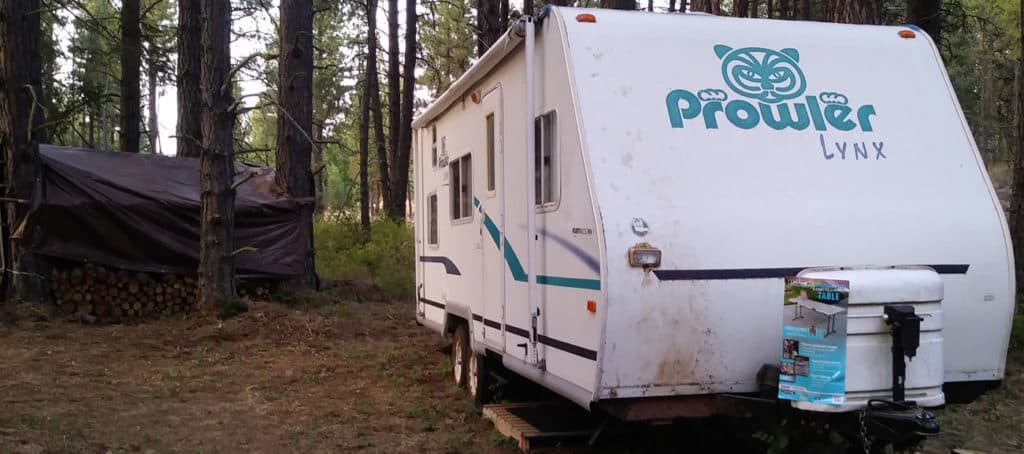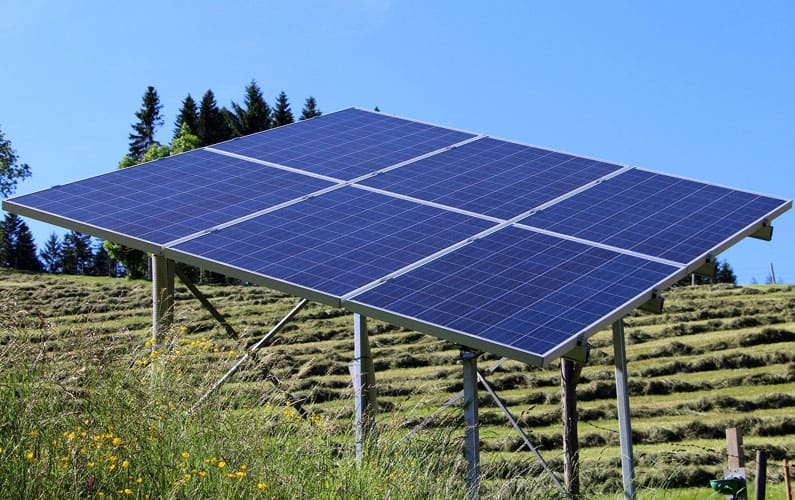
Until we parked our own travel trailer on our own property, I’d never really paid much attention to the term, Boondocking. So I decided to learn more about it and found it’s actually something that’s been around for a long time.
What is Boondocking? Boondocking, also known as dry or independent camping is the act of parking your travel trailer or RV in a location, typically away from standard designated (institutional) campgrounds, that offer no amenities such as power and water sources.
However, if there are limited amenities available they definitely can be used. There are some basic essentials needed that can make your experience better as listed below.
Boondocking can take place anywhere that it’s legal to park and set up a camp. This can be in the country, open desert, sandy lake or ocean beach, high back wood mountain range, and even certain businesses allow boondocking in their parking lots, or you could possibly park on yours or a friend’s remote property.
When I traveled a lot I would often park my Dodge minivan off the side of the road, at a rest area, in the parking lot of a truck stop, and a few times up in the mountains off an old logging road. This was long before I even knew boondocking was a word or even a thing.
But of all of those options, I found someplace close to a truck stop was best. That way I could get up early and pay to take a shower and get myself ready for the workday.
Things to think about when Boondocking or dry camping whether you’re on the road or on your remote property.
1 – Water: Very essential since like us, you might not have a working well yet on your property or if you’re out in the boonies there most definitely would not be an immediate source for at least potable water or other amenities available.
Before we got our well in, during the summer months, I would keep our trailer water tank as full as possible by topping it off before leaving the property on each trip. I have several 7-gallon water jugs that can be used to transport the needed H2O. You can find these types of water jugs here on Amazon.
This water in the tank is mostly for things like washing dishes and occasionally taking a shower. Drinking water is brought in one-gallon bottles and stored safely in the trailer. (This is a personal preference.)
2 – Power: When boondocking it typically means you’ll be parked somewhere that doesn’t offer any electricity. Power is handy for lighting your trailer as well as the area around it since it gets very dark out in the boonies with only the stars shining down on you. If you’re boondocking on your private property power might also be used for the following activities.
- Power Tools
- Computer Equipment
- A/C for those hot days
- Battery Charger
- Air Compressor
Ideally, a renewable source of power is the best choice when it’s possible. Solar panels have dropped drastically in price in the past few years and are probably the best source of natural energy.
Place a couple of them up on your RV or travel trailer to take advantage of the charging power of the sun to a couple of batteries. Then use an inverter to convert that stored 12-volt energy into useful 120 volt AC electricity.
Another source of renewable energy is a wind turbine, especially if you find yourself in a windy area of the country. Although it’s not as easy as solar panels, it could come in hand when the sun isn’t shining due to a cloudy, or stormy day.

3 – Generator: If the sky is overcast then there’s not going to be any sun for your solar panels. You might have several batteries in your RV or trailer but eventually, they’ll get drained and require a recharge. If all else fails it’s best to have a generator that will provide immediate power to your RV and a way to charge your batteries using a smart battery charger.
TIP: If using a generator as a backup power source don’t forget the fuel needed to operate it. It’s an often-overlooked crucial item.
4 – Propane: For heating your trailer or RV on brisk days and cold nights and keeping your food cold in a propane refrigerator. There are several sizes of propane tanks, but to boondock, a 7-gallon propane tank, also referred to as 30 pounds, is the most common tank used.
A lot of travel trailers will have two of these typically stored on the tongue of the travel trailer. There are also some smaller units that house 5-gallon (20 lb.) tanks instead which are also commonly found on gas type BBQ grills. Be sure always to follow all the safety requirements about liquid propane gas and for additional safety, be sure to have older tanks recertified.
5 – Trash: This is pretty simple: whatever you pack in, pack it out. Some paper items could be thrown into the fire pit if a fire is allowed. For all other trash, throw it into a plastic bag.
Be mindful that there are wild animals in the great outdoors, and they love getting into the trash, so keep the trash bag suspended out of reach or sealed in a plastic or metal can.
Whatever you do, don’t just leave it lying around for someone else to deal with it. That’s not cool!
6 – Food: A grocery store may not be very close if you’re out in the middle of nowhere so having enough food with you will make your experience more comfortable. It’s best to lay out a meal plan for the days you’ll boondock to ensure you have all the ingredients. Then throw in some extra just in case you end up staying out a couple of days longer.
7 – Lighting: For those long boondocking trips LED lights inside the RV or trailer will help to conserve power. I purchased and installed various types of portable LED lights within our travel trailer for night time use. This way we didn’t need to use the batteries or generator.
For outdoor lighting, I devised a solar-powered security light that’s attached to a wood board. I can then easily mount that board to a tree using some screws. But, if you prefer to not use screws some wire for warping around a small tree will work as well.
8 – First Aid Supplies: When out in the middle of nowhere boondocking it could be difficult to call 911 emergency or run to the medical center. Make sure you have a good supply of first aid items to help assist with slivers scratched knees to the more open severe gashes.
No matter where you live or camp it’s always advisable to have basic first aid knowledge. After all what good will the first aid kit be if you don’t know how to apply any of it?
9 – Dishwashing Bowl – It’s not absolutely crucial but can help with conserving water. We add water to the bowl that sits in the sink. As we have a need to clean a plate, bowl, or utensil, we simply use the same water throughout the day.
Once the water is too dirty the bowl is emptied outside and the process is repeated. This way we’re not constantly turning on the faucet where the water drains into the gray tank and the water pump constantly kicks in using additional precious power from the batteries.
10 – Gray Water and Human Waste: Assuming you are boondocking only for a temporary amount of time, you can use your trailer or RV’s black and gray tank during your stay, then empty it once you’re near a dumping station. If you’re going to be more permanent, then you might want to consider something like a compost toilet or portable pot instead of using the black tank.
Then create an external temporary gray tank to use in the event you fill-up the onboard tank. Depending on where you’re located (check local and state regulations first) you might be able to let your gray water run out onto the ground typically into a hole filled with some gravel.
Final Words
There are many other things you’ll need before heading out to begin your Boondocking journey. These are ten items I found in my experience of being the most important. As you continually boondock, there will be other things that will need consideration like:
- Skirting to help keep you warm on those cold nights or even days.
- Portable fan to help keep your trailer cooler but without having to run the A/C.
- Outdoor cooking for those hot days when cooking inside is not worth it. Running the A/C won’t always be practical, especially if you’re getting power from batteries.
- A portable fire pit for locations where there’s not a fire pit, or you must have your own to have a fire.
- Outdoor shower to help conserve potable water in your RV or trailer.
- Fishing poles for when you can catch your dinner.
Also, make sure you understand the regulations regarding this form of freedom camping and have respect for the wildlife if Boondocking in a more remote wilderness area. Remember, you’re in their backyard, and they may not like having their picture taken so always be wise by keeping a safe distance.
Now get on out there and start enjoying the sense of freedom that Boondocking can bring!
